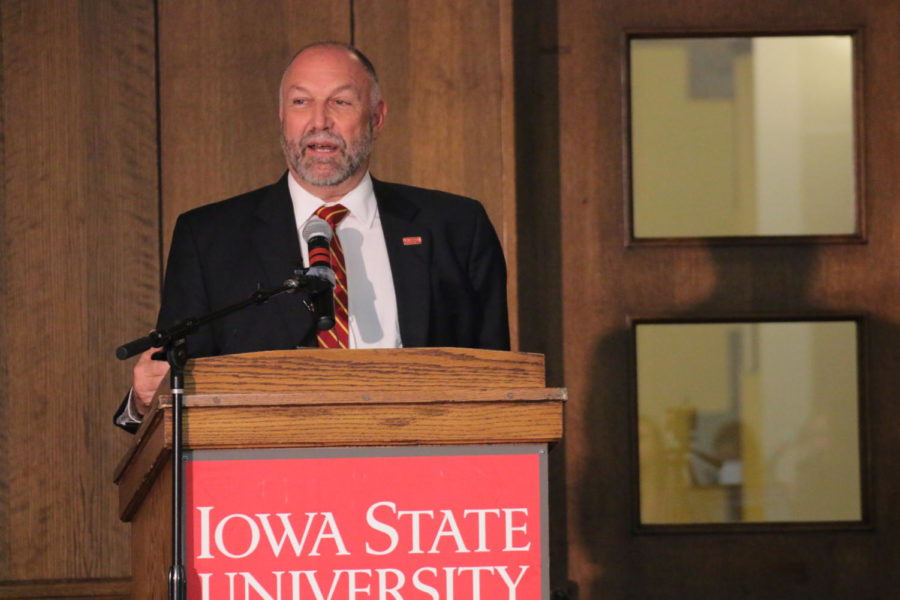Iowa Legislature slated to approve $18 million in budget cuts from regent funding
Iowa State President Steven Leath addresses the student government over concerns regarding his use of a University owned aircraft Oct. 5.
January 24, 2017
Compared to the initial $25.5 million in budget cuts proposed by Gov. Terry Branstad, funding reduction in higher education may be reduced to roughly $18 million after a budget deal was brokered between the leaders of the Iowa Legislature Monday evening.
The deal, which was approved by leaders in both the House and Senate, would cut $8 million from Iowa State and the University of Iowa, and $2 million from the University of Northern Iowa this year.
The $18 million in regent budget cuts is just a portion of the $110 million in the state funding reduction proposed in early January by Branstad, who is slated to leave for the U.S. ambassador to China position should he be approved later this year.
The bill cleared a Senate subcommittee Monday and is expected to be ratified by the end of the week.
The cuts come as part of a $117.8 million spending cut agreed upon by Branstad and Iowa House and Senate Republican leaders in an attempt to fix budget shortcomings for the fiscal year ending June 30.
The Iowa Legislature previously approved for the current fiscal year $232.2 million for Iowa, $184.4 million for Iowa State and $97 million for UNI.
While regent officials told the The Des Moines Register that these cuts will not increase tuition for the 2017-18 academic year, future tuition increases will depend on whether the Legislature can accommodate the regents’ funding request for the next fiscal year.
Iowa State Student Body President Cole Staudt said that while he is disappointed at the decision to cut funding [from higher education,] he’s glad the amount has decreased from Branstad’s initial speculations.
“I’d like to see no cuts, but with today’s atmosphere, I think this is the best we can hope for,” Staudt said.
Staudt, however, wants to make the dangers of continuing to cut funding clear to legislatures.
“We need to make it very clear that we need [the funding] that the Board of Regents and Iowa State requested to hold undergraduate tuition increases down,” he said.
The Board of Regents agreed in December to hold resident undergraduate tuition increases at 2 percent for the next two years, but only if the state Legislature could provide a 2 percent increase in funding as well.
Josh Lehman, senior communications director for the Iowa Board of Regents, said that while any cut is tough, they appreciate the efforts made by both parties in the Iowa Legislature to reduce any additional potential cuts.
Lehman also said the regents will work with the university to make sure budget cuts won’t have an effect on student learning should the bill be passed later this week.
Iowa Board of Regents President Bruce Rastetter said in a statement following the initial proposal of the $25.5 million in budget cuts from higher education that he understands the constraints that Iowa faces and hopes to “make the required reductions in a way that has the least effect on students.”
Iowa State University President Steven Leath said in a letter to the Iowa State community Thursday evening that his administration would “take a very thoughtful and diligent approach” to managing the cuts in order to “minimize the impact on our students now and in the long-term.”
Leath said in his letter that the university would postpone nonessential deferred maintenance and repairs, delay some searches or eliminating vacant positions, reduce expenditures for professional development, equipment, travel, printing and communications and reduce some campus-wide services temporarily.
“Any reduction to our state appropriation is detrimental,” Leath said. “We will continue to call on the Governor and the General Assembly to make higher education a priority. Iowa State has demonstrated time and again that an investment in public higher education is truly an investment in a prosperous future for all Iowans.”
















